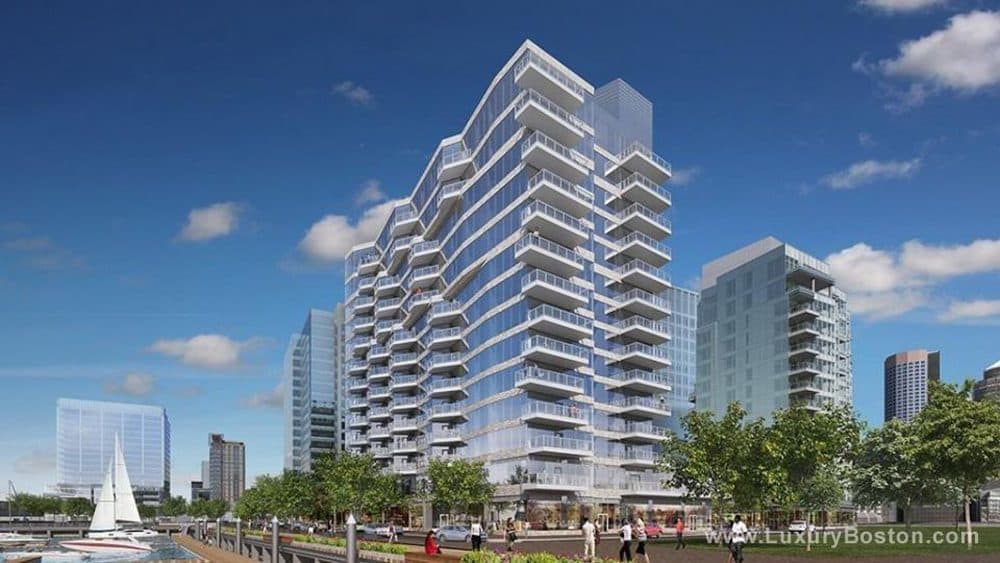Advertisement
City Picks GrubStreet For Reduced-Rate Occupancy Space In The Seaport

By the end of 2019, the first and second floors of a luxury condominium in the heart of the Seaport are expected to be transformed into a literary destination and narrative arts center.
After reviewing proposals from eight arts organizations and receiving feedback from the public, city of Boston officials told us Tuesday that they’ve selected GrubStreet, a nonprofit dedicated to creative writing, to occupy a 13,166-square-foot space located in 50 Liberty at Fan Pier.
"We really believe that the people in our community, writers from all backgrounds and income levels deserve to be in some of the most elevated real estate in the city,” said Eve Bridburg, GrubStreet’s founder and executive director. “The challenge for us is ensuring that everybody can get to us … we really see this as a shared space. We see ourselves as facilitators and space makers and we’re really looking forward to inviting our community in to help us curate and program the space.”
The center will include a stage and event space for performances like slam poetry, a community space for writers, a café, a podcast studio and classrooms.
“What was exciting to us about their proposal was the idea of having a really visible, public center for writing in the city of Boston,” said Kara Elliott-Ortega, Boston’s chief of arts and culture. “... If [people] want to know about writing opportunities, if they’re an emerging writer and they want to network with people, if you want to buy books from local authors, you know where to go.”
Bridburg said she expects the space to come alive in stages: first getting operations in place, then moving students in and finally opening the bookstore. Prior to securing this opportunity, GrubStreet had been looking for a new lease. The organization moved to Boston in 2005 from Somerville. Bridburg described their beginnings as eight souls promoting themselves with a simple flyer. They’ve grown to serve scores of students of all ages and backgrounds from neighborhoods across the city. GrubStreet also received a $2 million donation from the Calderwood Charitable Foundation and are in the midst of a capital campaign.
Advertisement
“This is why this is such a beautiful thing for us,” Bridburg said. “We’ve moved every five or six years for the last 21 years. We’ve been all over the place and this city is becoming so expensive. Though this is a leap, it will be sustainable over time. We won’t be subject to market rate rents.”
The developer is providing $25 per square foot for GrubStreet's construction fees (the organization estimates costs to be much higher). The city has estimated rent at this location at $1 per year, though Bridburg notes GrubStreet will be responsible for condo fees.
“The whole idea is to make it affordable,” said John Barros, Boston’s chief of economic development. “It’s supposed [to] not only be affordable on the lease side of it, but the city made sure it’s affordable on the tax side as well.”
The state requires that development on waterfronts allow for a certain amount of space for civic and cultural use, Elliott-Ortega said. The city worked with the Boston Planning & Development Agency as well as the developer, the Fallon Company, hoping to draw diversity to the Seaport, something the neighborhood has struggled with. City officials noted they tried to make the request for proposal process as open and transparent as possible.
While the city did not choose the Cross Cultural Collective (C3), a black arts collaborative that focuses and promotes the African diasporic arts in Boston, for this space, it did announce its financial support for the newly formed organization. In collaboration with WS Development, the city has offered $150,000 in technical assistance to C3 over the next two years to have it eventually operate its own space in the Seaport.
“What we wanted to do was bring African diaspora arts to the Seaport ... which is not normally negotiated by people of color on a consistent basis,” said L’Merchie Frazier, one of the six founding artists. “Opening the Seaport to all the people is an aim of C3 with a recognition that the harbor is where African and people of color arrived from 1638 forward. We’d like to share with Boston residents, visitors and the world the contributions of people of African descent.”
